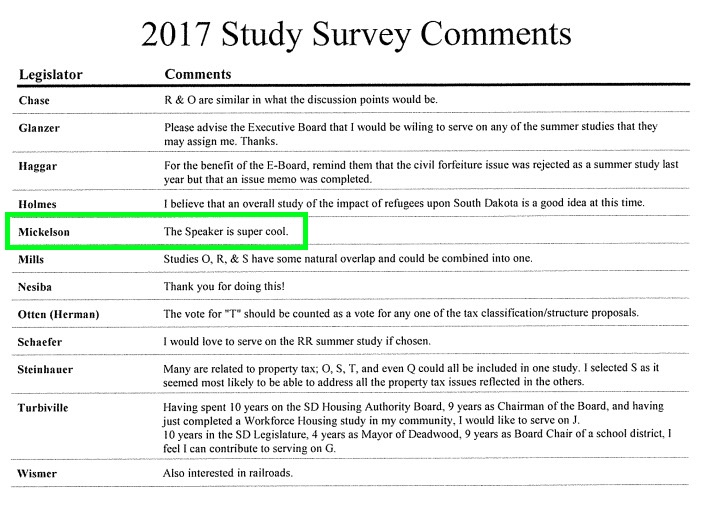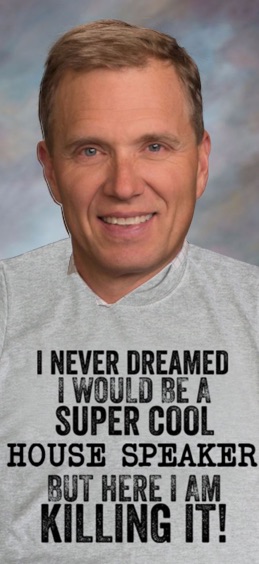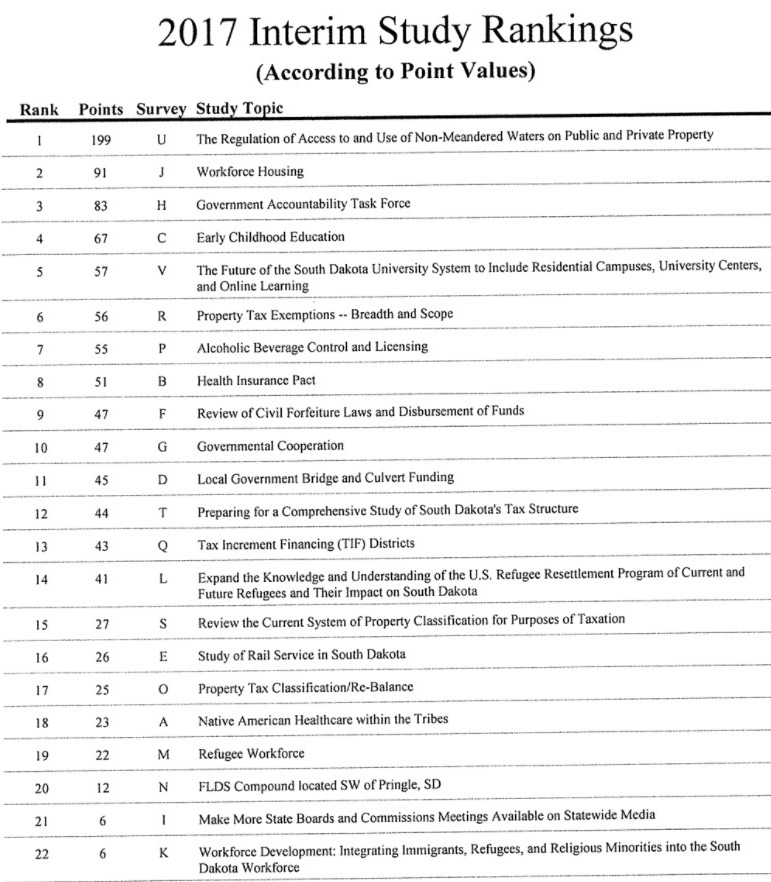Speaker of the House G. Mark Mickelson (R-13/Sioux Falls) is a funny guy. The Legislature’s 2017 Interim Study Survey included a comment section where Speaker Mickelson submitted this important guidance for his colleagues’ consideration:

 Speaker Mickelson certainly has an eye for the super-cool topics for interim study. Today the Legislature’s Executive Board picked two of the topics the Speaker ranked highest for study before the 2018 Session: the non-meandered waters issue and workforce housing.
Speaker Mickelson certainly has an eye for the super-cool topics for interim study. Today the Legislature’s Executive Board picked two of the topics the Speaker ranked highest for study before the 2018 Session: the non-meandered waters issue and workforce housing.
The non-meandered waters issue will take some serious thinking… or maybe just a new survey and a big round of eminent domain (because ultimately, that’s what the fishing advocates are after, the state finishing the taking that the rain gods started). But workforce housing? Come on, G. Mark—that’s just another issue where Republicans and business owners are going to ignore the obvious solution: raise wages, and workers can afford to fix up or buy houses. (There, done, saved you three meetings.)
76 of our 105 legislators* responded to the interim study survey by April 12. Summing their rankings produces this list of preferred topics:

Legislators came nowhere near taking my dare to put refugees on the interim agenda: the three refugee-related topics finished 14th, 19th, and dead-last 22nd. Adding those three topics’ rank points still wouldn’t have beat non-meandered waters or workforce housing (or #3, issues facing the new Government Accountability Task Force). The least popular of those three refugee study proposals, Study “K”, came from Democratic Senator Reynold Nesiba, whose District 15 includes a lot of refugees have settled in Sioux Falls. His proposal was phrased favorably toward refugees, immigrants, and religious minorities, seeking study of these questions:
- How do we ameliorate differences and better facilitate cross-cultural understanding to more quickly and effectively integrate new South Dakotans into our workplaces?
- What is already working at firms with diverse workforces?
- What obstacles exist to further integration? How do we overcome these?
What? Senator Nesiba wanted to get rid of obstacles to making new people part of South Dakota? No wonder it came in last: the only other legislator to express interest in Senator Nesiba’s positive refugee proposal was fellow freshman Rep. Bob Glanzer, Republican from Huron, where a number of Karen refugees have settled to work at the turkey plant.
*p.s.: Legislators not responding by April 12 and not listed on survey tally:
- Reps. Anderson, Bartling, Bordeaux, Brunner, Conzet, DiSanto (no guns on topic list, so boring!), Frye-Mueller, Goodwin, Hunhoff, Johns, Kaiser, Latterell, Marty, McCleery, McPherson, Kent Peterson (hey! Mr. Assistant Majority Leader! How about leading?), Qualm (hey! Mr. Majority Leader! Ditto!), Ring, Rozum, Smith, Wiese, and York;
- Senators Cammack, Cronin, Killer, Monroe (certifiably allergic to study), Russell, Tidemann, and White.
“Workforce housing” sounds like a term from the movie “The Grapes of Wrath.” It has hints of a “Pullman Company” mentality towards workers, where the Orwellian nature of the words “workforce housing” is used to replace what should be more honestly called migrant or sharecropper housing in a tenement manner.
This interest in “workforce housing” from a state legislature, which fights minimum wage increases all the time, is at best analogous to the willingness of the anti-worker Chamber to help fund the recent Thrive study in Sioux Falls concerning affordable housing.
The Workforce Housing Study should address:
– Study ways South Dakota can help teachers cope with escalating housing costs. An affordable housing payment is one that consumes 31% or less of a monthly income. It also assumes a 20% down payment on a home, a big if for a young first-time homebuyer and a 30-year mortgage at a rate of 4.1%.
– Study and define a program for teachers to buy homes with no interest loans. These homes must be sold for no profit when the teacher desires a larger home or quits the profession. After that sale, the loan could go to another young teacher, starting out.
At least Mr. Nesiba did not comment something about the Speaker not needing his pants.
I note that Shaefer liked the rail road items. Wismer also likes trains.
Glad the non-meandered water issue is getting time. SD Legislature has had a couple decades to resolve the issue, but always kicked that can down the road.
According to some old data from GF&P, half of our publicly available fishing waters are non-meandered waterways (about 240,000 acres). The economic impact of constricting fishing access, in an already struggling economy, shouldn’t be ignored. We need clarity about the intersection of private property rights, tax burdens, and public access to South Dakotans’ waters.
some of the topics could have been combined into one subject for example a study of refugees or property taxes. If they were combined would they have a higher score?
I wonder if any of the legislatures were smart enough to vote for a single topic for all 5 of their choices to give it 15 points allocated. I know they used to back in the day. The Speaker then was Super Cool too.
JKC: indeed, how does “workforce housing” differ from most housing? Doesn’t the majority of housing house at least one worker?
Porter, I can see the merits of a housing program to help teachers, and since teachers are public employees whose pay depends keenly on Legislative decisions, I can see the argument that the Legislature has an obligation to help with that housing. But I’m inclined to go with the simpler argument: pay teachers decent wages, and they’ll have no problem buying or building good houses.
Plus, I’d suggest that a program limiting sale of the house discourages investment in home improvements. Consistent higher pay, year after year, will do more to promote improvements of housing stock community-wide.
Grudz, you kinda maybe oughta drop that Nesiba attack, given that prosecutors abandoned the case in the absence of reliable evidence. Your insult thus floats in the ether without substantiation.
Wayne, I’m curious to see on which side legislators will come down, property rights or fishing/economic interests. The fact that some businessman can make more money and the state can make more tax revenue by using my land for something other than what I want to use it for is the thesis of the Kelo v. New London decision that I thought South Dakota had rejected.
An honest philosophical question: To what extent do property rights remain when land is flooded long-term? To what extent can an owner claim rights to land that the owner can’t use for anything other than fishing and boating?
I look at workforce housing very similar to affordable housing.
As far as teachers are concerned, I would be happy with a program that provide teachers with a Govenor’s house, for X number of years of service, or reduce cost. Of course school boards would have ante up as well.
Mr. H, nobody can be prosecuted for saying “You don’t need those pants.” It’s not against the laws. But the saying of the phrase is an acknowledged fact. I am told it is a widely repeated phrase in the legislatures.
I do note that Mr. Nesiba, who seems polite in a way I can respect, provided as his comment that he thanked the people who were surveying them all. To me that shows he is probably a swell fellow regardless of politics. I expect we will hear much more from Mr. Nesiba during the next sessions as he has now cut his teeth and will probably move into leadership.
MC, on combining topics, that wouldn’t have put the three refugees topics in the top 2 (see note in original post). The five tax topics I see—R, T, Q, S, and O—would have had 195 rank points combined, which would still have put them in second place behind non-meandered waters.
MC: why give cheap Governor’s Houses? Why not just make sure pay goes up and keeps up with housing prices?
I think free housing for the starting teachers might be a good idea. Once they work for a few years and earn their way up with the raises they can sell it and then move into the swankier neighborhoods like everybody else does. Another option might be to give them half the cost of one of these starter houses towards buying an established house in the towns they are going to teach in. The towns might even help out with a package of enhancements for living in the town. Cheaper utilities, for instance, or a coupon book from the local economic development corporation for free oil changes, maybe really low rate financing on a new car, dinners around town and such. This would encourage teachers to move to the town, kids to go into teaching, and promote the local economy with stimulating activity.